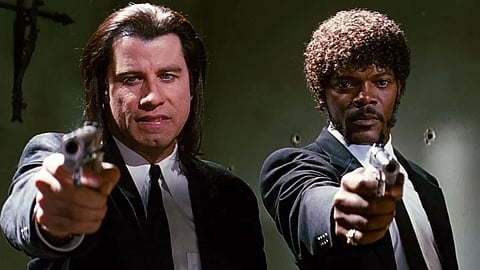

Quentin Tarantino’s classic crime thriller Pulp Fiction is turning 30 this year. The main star cast of the film has already started gearing up for the 30th anniversary of Tarantino’s cultural phenomenon. The film is best remembered for its nonlinear narrative, portrayal of gangsters as cool people, and use of comedy in otherwise serious situations. The film, with a star-studded cast, also contains many nuggets of wisdom and life lessons. Here are five takeaways from Pulp Fiction for those with a philosophical outlook on life.
Second Chances Exist
One of the main themes of Pulp Fiction concerns fate and redemption. For instance, a pivotal scene shows bullets going through Jules Winnfield (Samuel L Jackson) and Vincent Vega (John Travolta). The bullets do not harm the two, despite leaving holes in the wall right behind them. Jules views this as a case of divine intervention and starts to believe in the existence of a higher power. It also encourages him to mend his ways and tread a more peaceful path in life, as exemplified by the line, “I’m trying real hard to be the shepherd.” Conversely, Vincent does not have the same views as Jules and chooses to walk pretty much the same path as he always has done. The choices that Jules and Vega make explain the eventual fates of the two characters in the film.
Keep Your Cool Under Pressure
Jules remains calm as Pumpkin (Tim Roth) and Honey Bunny (Amanda Plummer) put him at gunpoint and try to mug him in a restaurant. Instead of reverting to his violent ways, he deescalates a potentially dangerous situation with mere talk. He also keeps his friend Vincent Vega in check as the situation threatens to spiral out of control. Now, what's Pulp Fiction without some humour? The scene takes a quirky and hilarious turn when Jules refers to his wallet as “Bad M***********” and calls his gun “Mr 9 Millimetre.” The Biblical reference that comes soon afterwards sums up the film’s premise of fate and redemption.
Jackson once told film critic Gene Siskel that the scene was not part of the screenplay until his audition. Speaking on the film's success, he said, “Theatre is a tell me medium and film is a show me medium, but Quentin found a way to marry the two.”
Let Let Your Hair Down Once in a While
An iconic scene in Pulp Fiction sees Vincent Vega and Mia Wallace (Uma Thurman) groove to Chuck Berry’s “You Never Can Tell” at Jack Rabbit Slims, a 1950s diner. It leaves a lesson that is ultimately about finding joy in the unexpected, breaking free from routines, and living life to the fullest, even if this means doing the twist in a 50s diner with a gangster's wife. The scene popularised the song ‘You Never Can Tell’ from Chuck Berry. Pulp Fiction star Uma Thurman did not fancy the use of the song at this point of the film, but Tarantino reassured her of its suitability for the scene.
Loyalty is Key
One of the subplots of Pulp Fiction involves Captain Koons (Christopher Walken) giving the watch from his father to Butch Coolidge (Bruce Willis) as a keepsake and a symbol of trust. When Butch pawns the watch initially, he breaks the trust and dishonours the captain’s legacy. However, Butch later risks his life to retrieve the watch to redeem himself, live up to his sense of loyalty to the captain, and honour the latter’s legacy.
Oddly enough, it does not always reap the rewards. Vincent remains loyal to Mia throughout their date night at the diner and to whatever else his boss Marsellus Wallace (Ving Rhames) asks of him, but he still winds up dead.
Perspective is Everything
The film plays with the concept of perspective, showing us the same set of events from different viewpoints, highlighting how subjective human understanding of reality can be. Take the early shootout in an apartment, for instance. First, Tarantino shows the event unfolding from Vincent and Jules’s perspectives. Later, he shows it from Marvin’s viewpoint, with a hint of extra humour and confusion. The contrast highlights how our identity and position shape our perception of life events. Tarantino’s wide shots and close-ups convey the contrasting perspectives of the characters at the time. It also helps us get a better sense of character motivations and the world they occupy.